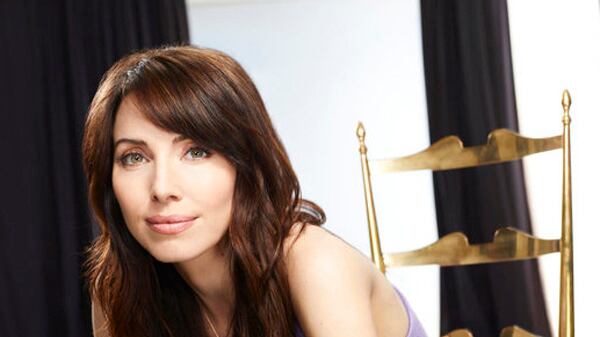At first glance, it may be easy to dismiss Whitney Cummings, the star of a new NBC sitcom Whitney, as just another Hollywood bombshell with no comedy chops. It doesn’t help that her show, which debuted Thursday night, falls short on big laughs and is hobbled by a retro ‘90s feel with its multi-camera format and live studio audience. But Cummings is one of the buzziest stand-up comedians in the country, a 29-year-old leggy brunette who spent five years circulating in the Los Angeles comedy club scene--and she’s more groundbreaking than you think.
When Cummings’ signed on with NBC in May, she became the first “pretty girl” stand-up ever to write and star in her own primetime network slot. In a beauty- and youth-obsessed culture, it may seem strange to suggest that a good-looking stand-up getting her own TV show would be anything remarkable. After all, everyone knows that in showbiz, pretty women get all the perks, from Mary Tyler Moore to Jennifer Aniston to, yes, even Tina Fey—who by now has graced the cover of a half-dozen fashion magazines. Our biggest network comedy stars have almost all had a trim figure and a comely face. But there’s always been one corner of the business where that has not been true: stand-up comedy, where brassy broads (Roseanne Barr, Brett Butler), and sexually ambiguous funny women (Ellen DeGeneres before she came out) have traditionally ruled.
There’s a reason: Not too long ago, conventional wisdom had it that pretty girls couldn’t do stand-up, an aggressive art form that is generally considered doing comedy “like a guy.” As Johnny Carson, legendary host of The Tonight Show and stand-up kingmaker, told Rolling Stone in 1979, “A woman is feminine, a woman is not abrasive, a woman is not a hustler. So when you see a gal who does ‘stand-up’ one liners, she has to overcome that built-in identification as a retiring, meek woman. I mean, if a woman comes out and starts firing one-liners, those little abrasive things, you can take that from a man.… I think it’s much tougher for women. You don’t see many of them around. And the ones that try, sometimes are a little aggressive for my taste.”

Carson’s viewpoint played out for years in the comedy clubs where pretty women often had it harder than their brassier or less conventionally attractive counterparts. “I remember seeing beautiful girls do stand-up, and it was a disaster every time,” Margaret Cho told me during an interview for Marie Claire in 2009. “Not only were people not gonna listen to you because you’re a woman, if you’re good-looking, people really don’t want to listen to you.”
“Comedy is all about watching somebody on stage be really honest and talk about their perception of the world in a funny way. But it is about vulnerability, people have to identify with those things and that’s what everybody is laughing at,” says comedy manager Dave Rath, a Cummings fan. “So when a hot girl goes on stage all the guys want to be with her and all the women are like, why is my boyfriend looking at her that way? So the audience was always put off a little bit by attractive women.”
Even Cummings confesses to hiding behind drab clothes and self-deprecating humor to make herself more likable in her early years. “When I first started doing stand-up, I would wear hoodies and no makeup and I would wear my hair back and sneakers. I used to self-deprecate a lot—I just got cheated on, I just got broken up with, I hate myself—to make women go, ‘Okay, she’s just like us, she has problems too,’” she said. “But whereas I used to think that looking pretty or sexy would alienate women, now it’s the opposite. Now I feel like when I embrace my femininity, it makes women relate to me more, because they go, ‘Oh, she’s just like me, she puts on makeup, she tries to look cute, she wears Spanx and she wears heels.’ And I think that being known helps, you can get away with more.”
Cummings may also be getting away with more in the looks department because of how much comedy culture has changed over the past decade. While shoulder pads and boxy pantsuits were the hallmark of the ‘80s female comic, the past decade has seen the kind of stand-ups who wear jeans on stage, but also look great in lipstick and a tight shirt. First there was Sarah Silverman, girly-voiced, tomboyish and potty-mouthed—the guys loved her. Then, Chelsea Handler, a tall, sassy blond in dresses who appealed to gals. Both women found a niche on cable, which has a considerably smaller audience than network, and only now that both have achieved superstar status will each one get NBC sitcoms next year. (Handler as a creator, not a star; Silverman with a pilot commitment.)
Among the up-and-comers, there’s been a rise in stand-up bombshells, too: Natasha Leggero, a judge on the 2010 season of Last Comic Standing, now a regular on the new NBC show, Free Agents; Iliza Shlesinger, the first female winner of the Last Comic Standing (2008), and host of a new reality dating show, Excused; and Anjelah Johnson, a YouTube sensation who was formerly a cheerleader for the Raiders. Comic Lisa Sundstet, who’s been running an L.A. showcase called Pretty, Funny Women since 1996, which once featured Chelsea Handler, has designed her whole show around the idea that women should be funny but feminine. “When I was starting stand-up comedy the comics that were very famous were Roseanne, Rosie O’Donnell, Brett Butler, Paula Poundstone. They were very masculine, and maybe androgynous,” Sundstet says. “It wasn’t a sexy profession for women. There was no woman who women could look at and go, I wish I could do that. If you were going to be a stand-up comic you knew that you might have to be a guy.”
The problem, of course, is that Cummings is not just an attractive woman. She’s an incredibly hot one who actually fits the impossible Hollywood standard, and her potential success runs the risk of shutting out all comics who don’t fit that mold. Tina Fey might have been saying as much in a 30 Rock episode last season called “TGS Hates Women,” in which Liz Lemon hires a baby-voiced, big-titted stand-up in hot pants but discovers the dumb blond was really a dowdy brunette. And some may also argue that Tina Fey herself—though not a stand-up—has already proven that pretty can be funny. The difference with Fey, however, is that her cover-girl looks were revealed only after she debuted her show. For Fey, the trajectory was a funny woman who turned out to be beautiful, not a beautiful woman who proved she could be funny.
That’s the challenge Cummings faces. With Whitney, it’s on Cummings—who describes her act as “picking up where Sex and the City left off”—to show mainstream American audiences that a girl they see as sexy can be funny too. She appears to have the street cred to do it: she’s been a regular on Chelsea Lately, a performer on Comedy Central’s raunchy roasts, and landed her own one-hour stand-up show she called, provocatively, “Money Shot.” With two highly visible network shows that premiered last week—Cummings also co-created CBS’s 2 Broke Girls with Sex and the City mastermind Michael Patrick King—the stakes are high. While 2 Broke Girls is off to a great start (it opened with 19.2 million viewers—and a 7.0 rating among adults 18 to 49—giving it the biggest audience for a fall comedy premier since 2001), Whitney, which Cummings created herself and which bares her name and face, did not fare as well. It debuted with 6.8 million viewers, and a 3.3 in the 18 to 49 demo (which is actually not bad by NBC standards.)
If the latter fails, it could signal to the industry, unfairly, that the old conventions about comedy are still true and that audiences aren’t ready for a rom-com sitcom centered around a good-looking female standup. But if she succeeds, it could be a sign that cracking hard jokes and speaking your mind isn’t the unattractive attribute it used to be.






